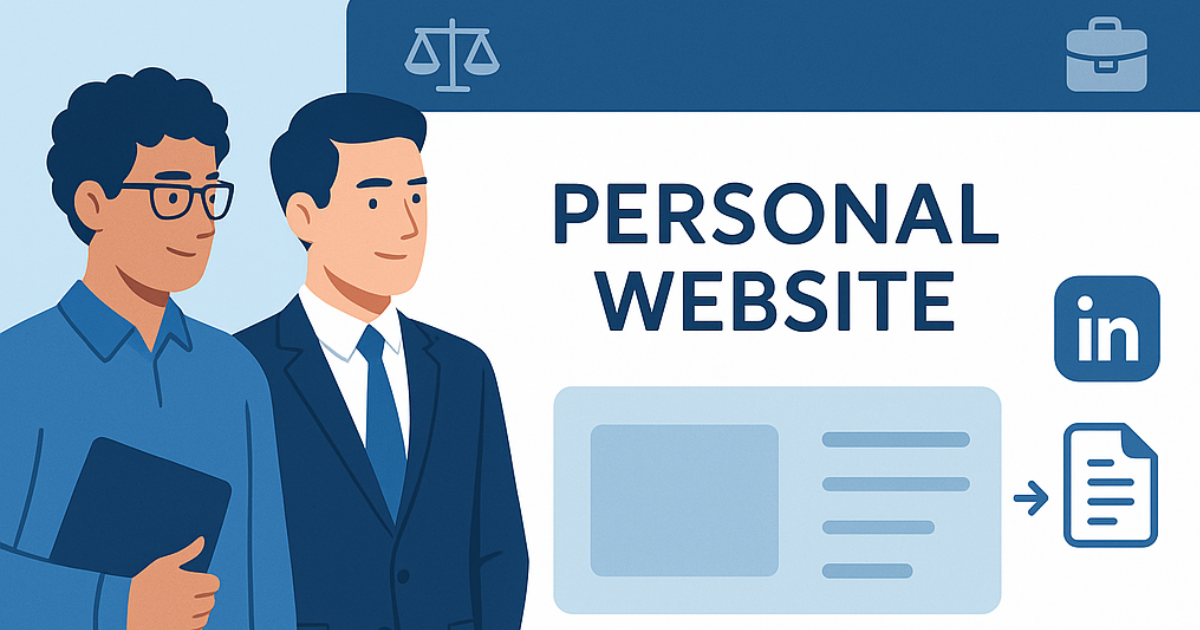
Hey there, fellow professionals! If you're a consultant juggling client pitches or a lawyer building your practice, you've probably spent hours polishing your LinkedIn profile or tweaking that resume. But let me ask you this: in a world where everyone Googles everyone else, is that enough? Spoiler alert: probably not. A personal website isn't just a nice-to-have anymore, it's becoming essential for standing out, controlling your narrative, and landing those dream opportunities. Let me break it down for you, based on what I've seen in my own career and from chatting with folks in the field
First Off, It's All About Owning Your Brand
Think about it, LinkedIn is great, but it’s like renting an apartment. You can decorate it, sure, but the landlord (ahem, LinkedIn’s algorithm) calls the shots. What if your profile gets buried in search results, or worse, the platform changes its rules overnight? A personal website is your own digital real estate.
As a consultant, you can showcase your niche expertise such as supply chain optimization, with case studies, testimonials, and blog posts that dive deep into your wins. Lawyers, imagine having a site where you highlight specialties like intellectual property law, with client success stories (anonymized, of course) and thought-leadership pieces that position you as the go-to expert.
I’ve talked to consultants who landed six-figure gigs simply because a potential client stumbled upon their site via a Google search. No more relying on social media’s whims, you control the story. In a competitive market, a site sets you apart from the sea of identical resumes.
Credibility and Trust: The Silent Sales Pitch
Let’s be real: people are skeptical these days. A quick Google search is the new background check. If all that comes up is your LinkedIn or a dusty firm bio, you might look like just another face in the crowd. But a sleek personal site? It screams professionalism.
For lawyers, it’s a way to build trust before the first consultation, share your bar admissions, speaking engagements, or even a FAQ on common legal myths. Consultants can use their site to display certifications, whitepapers, or a portfolio of past projects.
One lawyer friend told me her site was a game-changer during a slow period. She added a simple contact form, and boom, leads started trickling in from people who’d found her through organic search. It’s not about hard-selling; it’s about subtly proving you’re the real deal. Plus, in an era of AI-generated content, a human-touch site (with your voice and personality) builds the authentic connection clients crave.
SEO and Visibility: Get Found Without the Hustle
Search engines love fresh, relevant content. A personal website optimized with your keywords like “freelance marketing consultant in NYC” or “family law attorney in Chicago” can rank you higher than a generic LinkedIn page. Job seekers, this is gold for recruiters hunting talent. Consultants and lawyers often overlook this, but imagine clients finding you instead of you chasing them.
And networking gets a lot easier. Share your site on business cards, email signatures, or at conferences. It becomes a one-stop shop for everything about you. No more directing people to scattered links.
But Wait, Isn’t Building a Site a Pain?
Confession time: I used to think the same. Who has time to code or fiddle with templates when you’re buried in client work? That’s where the landscape has changed. Tools make it ridiculously easy now. Take something like VisePage, designed for busy pros like us. You can import your LinkedIn profile or resume in minutes, and it auto-generates a polished site with your bio, experience, and even a blog section if you want. No tech skills needed; it’s the fastest way to get online without the headache. I’ve seen consultants go live in under an hour, and lawyers create sites that look custom-built but take zero effort.
It’s not about fancy bells and whistles, it’s about getting something up that works for you. Why complicate life when you don’t have to?
The Bottom Line: Invest in Yourself
In 2025, the professional landscape is evolving fast. Consultants and lawyers who treat their online presence like a business asset are the ones thriving. A personal website isn’t just a digital business card; it’s your launchpad for growth, whether you’re seeking clients, jobs, or partnerships. It gives you control, boosts credibility, and opens doors you didn’t even know existed.
If you’re nodding along but haven’t taken the plunge, why not start today? Grab that LinkedIn export or dust off your resume, and see how simple it can be. Tools like VisePage make it a no-brainer, fast, easy, and tailored for folks like you.

.png)
